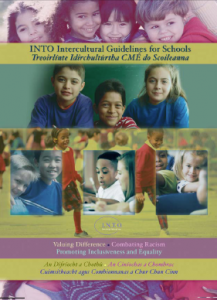Resource Title
INTO Cultural Education Guidelines for Schools
Summary
The INTO has drawn up guidelines to schools on best practice for the equal participation and outcomes in education of children of ethnic minorities, including Travellers.
The guidelines seek to support the development of inclusive strategies and enriching intercultural policies and practices in schools. They recognise that all schools have a responsibility to promote interculturalism and counter racism regardless of the ethnic profile of the school community.
Resource Details
Description
Intercultural education celebrates the positive aspects to cultural diversity as well as drawing attention to the power differences between groups and societies. These guidelines – presented in English and Irish – aim to combat racism, value cultural difference, and promote inclusiveness and equality in schools and classrooms in Ireland. The guidelines form a series of best practice resources for the equal participation and outcomes in education of children of ethnic minorities, including Travellers.
The guidelines follow the format of an introductory section and a related checklist for each topic. The checklist will act as an affirmation of what is already taking place in schools and, perhaps, a prompt for further action.
The topics include Enrolment Policies; Inclusive Strategies for Parents; Whole School Guidelines; Classroom Guidelines; Bilingual Learners; Bilingual Learners in the Classroom; Dealing with Racist Incidents; Ensuring Success.
Big Ideas in this Resource
- intercultural education is about respecting cultural difference and promoting antiracism, it is not simply the knowledge of a variety of cultures. It aims to counter misconceptions and negative stereotyping of different cultures, religions or nationalities and seeks to develop an appreciation of other cultures in the context of a critical appreciation of local/Irish cultures.
- Intercultural education celebrates the positive aspects to cultural diversity as well as drawing attention to the power differences between groups and societies.
- All schools have a responsibility to promote interculturalism and counter racism regardless of the ethnic profile of the school community.
- All children, not just children from ethnic minority groups, will benefit from an intercultural education and be better prepared for the intercultural environment in which they live
- While schools are implementing many of the strategies and policies contained in the guidelines it is important to ensure that racism does not enter a void where there is not a well thought out policy that ethnic origin, culture, colour is irrelevant to people’s intrinsic worth
Available from:
Download INTO Cultural Education Guidelines for Schools (PDF)

